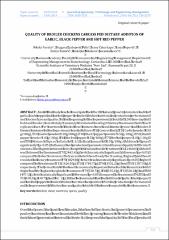Quality of broiler chickens carcass fed dietary addition of garlic, black pepper and hot red pepper

View/
Date
2019Author
Puvača, Nikola
Ljubojević Pelić, Dragana
Čabarkapa, Ivana
Popović, Sanja
Tomičić, Zorica
Nikolova, Nedeljka
Lević, Jovanka
Metadata
Show full item recordAbstract
Aim of this study was to investigate the effect of natural growth promoters such as
garlic, black pepper and hot red pepper in broiler chicken nutrition on production performances
and chicken carcass quality. At the beginning of the experiment, a total of 1200 one-day old
Hubbard broilers were totally randomly distributed into eight dietary treatments with four
replicates each. For nutrition of chicks three mixtures were used, starter, grower and finisher.
Dietary mixtures in the experiments was as follows: T1 (Control diet), T2 (Garlic powder 0.5
g/100g), T3 (Garlic powder 1.0 g/100g), T4 (Black pepper powder 0.5 g/100g), T5 (Black
pepper powder 1.0 g/100g), T6 (Hot red pepper 0.5 g/100g), T7 (Hot red pepper 1.0 g/100g)
and T8 (Mixture of spices in ratio of 1:1:1 in total amount of 0.5 g/100g). Addition of spices
significantly (p<0.05) influenced on production parameters and carcass quality of broiler
chickens. The highest achieved body weight of chicken was in treatment T6 (2460.6 g) which
was followed by treatment T7 (2442.4 g) with statistically significant differences (p<0.05)
compared to other treatments. In carcass which was ready for roasting, highest yield was
recorded in dietary treatment T7 (1829.8 g) which was statistically significant (p<0.05) higher
compared to treatments T1 (1626.5 g), T3 (1710.7 g), T4 (1532.2 g) and T5 (1587.5 g),
respectively. The primal cuts of the most economically important value such as drumsticks with
thighs had the highest weights in treatments T7 (530.7 g), T6 (525.2 g), T2 (520.2 g) and T8
(497.1 g), with statistically significant differences (p<0.05) compared to treatments T4, T5 and
T1 (438.5 g, 448.7 g and 461.1 g). It can be concluded that the addition of garlic, black pepper
and hot red pepper in broiler chicken nutrition has positive effect on production performances
and in improvement of chicken carcass quality which will be more acceptable by the consumers.
